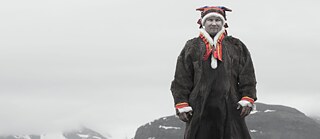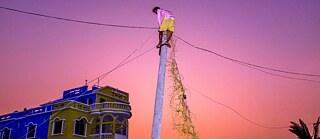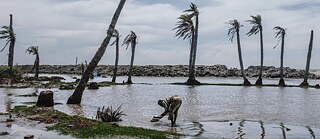das goethe 2/2020
The Right to be Cold

The tenth edition of “das goethe” is dedicated to the effects of climate change in the far north and in the global south. In the Arctic region, global warming is having a particularly serious impact, which has grown to become a tangible threat to the rights and traditions of the Sámi. The pictures by the Indian photographer Arko Datto lend the main topic another, no less disturbing perspective: In his project “Shunyo Raja. Kings of a Bereft Land” he documents the devastating environmental changes to which the people in the Ganges Delta are subjected. Datto’s project was funded by the Goethe-Institut and the Prince Claus Fund. It is part of the multimedia online exhibition Take Me to the River (takemetotheriver.net). What to expect in das goethe:
The urgency of everything
By Aka Niviâna Mørch PedersenThe year 2020 brought one disaster after another. Optimism was rare. Nevertheless, the cohesion and willingness to act, especially among young people, give our author Aka Niviâna a positive attitude. An essay about the challenges we are facing and the absolute will to tackle them.
A statement that might seem abstract and intangible, but actually pretty simple if you break it down. We live in 2020, a year with one catastrophe after another, a raging pandemic and a planet in self-destruction. The political environment seems more polarized than ever and the most obvious example may be what we see when we look at the United States. Though this is not a new thing, neither is the climate disaster. I think what gave many people - hopefully - a wake-up call this year was the COVID-19 pandemic that changed our lives, maybe forever. I am not going to address the situation as a good thing, but I think it told us about the absolute urgency of everything. Meaning, we cannot wait when it comes to acting on the issues that we face in this world. That means everything from the racial injustices occurring around the globe to the inequality regarding class and privilege, the colonial structures and the health care system. I am sure that I am missing other very important points, but the point stays the same. We. Need. To. Act. Now.

Leaving no traces
By Susanne HættaNot to harvest more than what is needed – that is the basic understanding of the Sámi. How does this fit together with a capitalist society in which nature is increasingly being exploited?

Nature has ceased to trust us
By Wjatscheslaw SchadrinThe lakes freeze over later, less fish is caught and ice roads melt: In Yakutia, climate change has long stopped being a theoretical concept.
Indigenous knowledge for environmental conservation
By Tero MustonenAcross Finland, we have welcomed the role of traditional knowledge, found in the villages, in understanding what and how things have changed. We link this with restoration science and actions on the ground to get to a new understanding of all aspects of past damages and previous ecological baselines.
Entire issue
The tenth issue of das goethe focuses on the particularly serious effects of climate change in the Arctic region. With the project “The Right to Be Cold”, we are looking at the climate crisis from a perspective that has so far received less attention: What does global warming mean for the people who have lived in the far north for many generations?Read the current issue of das goethe as a pdf!